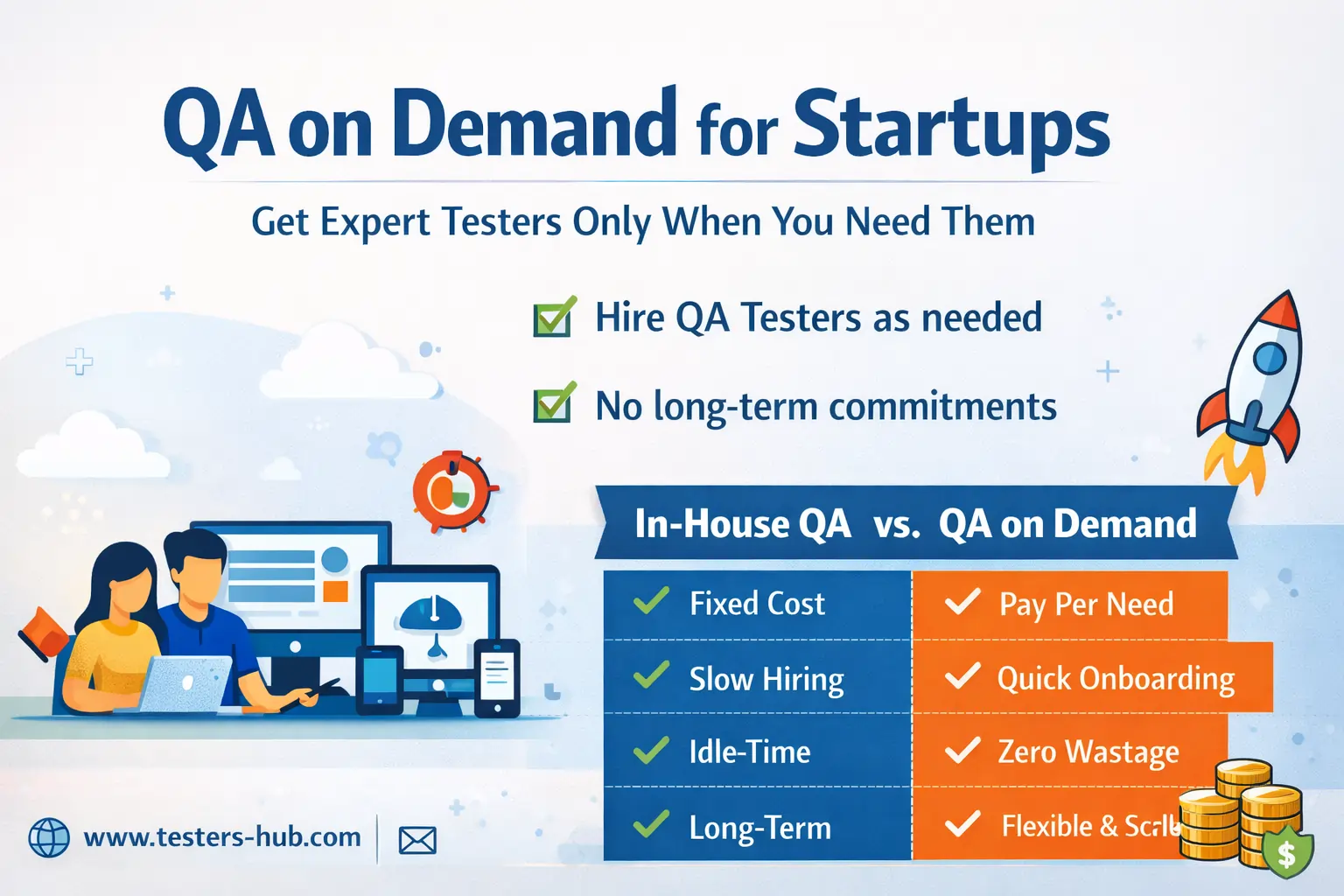Differences Between Healthcare Application Testing and Fitness Software Testing
The rise of mobile applications in both fitness and healthcare has brought with it significant advancements in how people manage their health and wellness. However, developing and testing apps in these two sectors requires vastly different approaches. While both fitness Software testing and healthcare app testing aim to ensure robust, high-quality user experiences, the stakes, data sensitivity, regulatory compliance, and functional requirements vary dramatically.
Importance of Software Testing in Fitness and Healthcare Apps
Before diving into the key differences, it’s essential to understand the critical role testing plays in both fitness software testing and healthcare app testing. The primary goals of testing in both domains are to ensure that the app is:
- Reliable: Users should be able to rely on the app’s performance and accuracy.
- Secure: Data security and privacy must be maintained, especially when personal or sensitive information is involved.
- Functional: All features should work as expected, providing a seamless experience.
However, the depth and focus of testing differ in significant ways between fitness and healthcare apps, primarily due to the differing nature of their data, user base, and compliance requirements.
Regulatory Compliance in Healthcare App Testing
Healthcare apps must adhere to strict regulations due to the sensitive nature of personal health information (PHI). In the U.S., the Health Insurance Portability and Accountability Act (HIPAA) ensures the protection of patient data. In Europe, the General Data Protection Regulation (GDPR) governs the collection and processing of personal health data, requiring explicit user consent and robust security measures.
Additionally, apps with diagnostic tools or telemedicine features may be regulated by agencies like the Food and Drug Administration (FDA). Compliance with these regulations during healthcare app testing is vital for safeguarding patient data and ensuring legal and operational integrity.
Fitness App Testing: Lower Regulatory Pressure
In contrast, fitness apps are generally not subject to the same stringent regulatory frameworks. While some fitness apps may collect personal data like weight, heart rate, or workout history, this data is typically considered less sensitive than the medical information found in healthcare apps. However, fitness apps that deal with biometric data still need to comply with general privacy laws like GDPR, especially if they operate in multiple regions.
The result is that fitness software testing tends to have a more flexible regulatory environment, focusing primarily on privacy best practices rather than strict compliance.
2. Data Sensitivity and Accuracy
Healthcare Application Testing: Life-Saving Data Accuracy
The accuracy of data in healthcare apps is paramount. Healthcare apps handle critical medical information such as diagnoses, prescriptions, lab results, and real-time monitoring of vital signs. Inaccurate data or errors could lead to devastating consequences, such as improper treatment or even life-threatening situations.
Healthcare testing companies must thoroughly test for the accuracy and reliability of medical data and ensure that the app integrates properly with Electronic Health Records (EHR) systems. For example, if a healthcare app miscalculates a medication dosage or fails to deliver an important test result, the consequences can be severe.
Fitness App Testing: Data Accuracy with Lower Stakes
While accuracy is important in fitness apps, the stakes are lower. Errors in workout tracking or step counting may frustrate users but won’t have the life-altering consequences that errors in healthcare apps could bring. For example, if a fitness app inaccurately logs the number of calories burned during a workout, it’s unlikely to cause any real harm to the user.
However, fitness software testing still needs to ensure that the data collected from devices (like smartwatches or fitness trackers) is accurate, especially since many users rely on these apps for setting and achieving personal fitness goals.
3. Role of Healthcare Testing Companies vs Fitness App Testing Providers
Healthcare Testing Companies: Industry-Specific Expertise
Healthcare application testing companies are specialized firms that understand the complex regulatory and functional requirements of healthcare apps. These companies ensure that healthcare apps comply with strict laws, maintain data privacy, and deliver safe, reliable services to patients. Their expertise includes:
- Integration with EHR systems
- Telemedicine functionalities
- Diagnostic tool accuracy
- Adherence to FDA guidelines for medical devices
Fitness App Testing Providers: General App Testing Services
In contrast, fitness software are typically tested by companies or teams that focus on general fitness software testing. Their priority is to ensure app usability, performance, and engagement. While privacy and security are concerns, the expertise required for fitness app testing is less specialized than in healthcare.
4. Security Testing
Healthcare App Testing: Protecting Highly Sensitive Data
Due to the highly sensitive nature of personal health data, healthcare app testing includes rigorous security measures. Testing for compliance with HIPAA and GDPR ensures that patient data is encrypted, securely stored, and transmitted with strict access controls. Healthcare apps must implement:
- Multi-factor authentication (MFA)
- End-to-end encryption
- Role-based access controls to prevent unauthorized data access
Given the increase in cyberattacks targeting healthcare systems, security testing in healthcare apps is of utmost importance.
Fitness App Testing: Basic Security Measures
Security testing for fitness apps is important, but it does not carry the same weight as in healthcare apps. While fitness apps often collect personal information like age, weight, and exercise routines, the level of sensitivity is lower. Fitness apps typically require basic security protocols like encryption and secure authentication, but there is less pressure to implement multi-layered security systems.
5. Functional Testing and Usability
Healthcare App Testing: Complex, Multi-User Systems
Healthcare apps are designed to serve various stakeholders, including doctors, nurses, patients, and healthcare administrators. As a result, healthcare app testing must ensure that the app works seamlessly for multiple user types, each requiring different permissions, access levels, and functionality. Testing must account for:
- Patient data access and sharing
- Doctor-patient communication tools
- Integration with external medical devices (e.g., blood pressure monitors)
The functional complexity of healthcare apps makes usability and functional testing more challenging, as every aspect needs to be thoroughly tested to avoid jeopardizing patient care.
Fitness App Testing: Focus on User Engagement and Simplicity
Contrarily, assessing fitness apps is primarily concerned with user interaction and usability. Considering that most of the app’s target users are fitness enthusiasts or those looking to get healthier, making the app intuitive, inspiring, and user-friendly is the main objective. Fitness apps frequently test the following features:
- Activity tracking (steps, exercises, heart rate)
- Establishing objectives and monitoring advancement
- coordinating with wearable tech
Compared to healthcare apps, fitness apps usually feature fewer user roles and easier workflows.
6. Interoperability Testing
Healthcare App Testing: Seamless Integration with EHR and Medical Devices
Healthcare apps often need to integrate with a variety of external systems, including Electronic Health Records (EHR) systems, insurance platforms, and medical devices. Interoperability testing ensures that data flows smoothly between these systems, which is critical for maintaining accurate patient records and delivering real-time insights. For example, telemedicine apps must seamlessly connect doctors and patients while accurately transferring vital health data.
Fitness Software Testing: Syncing with Wearables and Fitness Devices
In fitness app testing, interoperability typically focuses on syncing data with third-party fitness trackers and wearables (e.g., smartwatches). While this requires accurate data exchange, it’s generally less complex than the integrations required in healthcare apps. Testing ensures that data like steps, heart rate, and calories are correctly synced and displayed in the app.
7. Performance and Load Testing
Healthcare Application Testing: Ensuring Stability During Critical Moments
Performance testing in healthcare apps is crucial, as any downtime or lag could directly impact patient care. Load testing must ensure that the app can handle high traffic during peak times, such as during virtual doctor consultations or when hospitals are managing large volumes of patient records. Any delays in healthcare apps can have serious consequences, making this type of testing essential.
Fitness Software Testing: Handling High Traffic During Events
While fitness apps don’t carry the same risk as healthcare apps, performance testing is still important, particularly during high-traffic periods, such as during fitness challenges or live virtual classes. The goal is to ensure that users have a smooth experience without crashes or performance slowdowns, especially when syncing data or streaming live workouts.
8. User Base and Testing Complexity
Healthcare App Testing: Multi-User Roles and Complex Workflows
Healthcare apps cater to a wide range of users, including healthcare professionals, patients, caregivers, and administrators. Testing must ensure that the app works effectively for each user role and supports complex workflows. For example, doctors need access to detailed medical records, while patients need to schedule appointments or view lab results.
Fitness Software Testing: Simpler User Base and Testing Scope
Fitness apps typically have a simpler user base — individuals who are tracking their fitness journey. As a result, the testing scope is narrower, focusing more on user engagement and experience rather than complex workflows or permissions. Fitness app testing is generally less complex, focusing on core functionalities like activity tracking, goal-setting, and device syncing.
9. Legal Implications of Bugs and Errors
Healthcare App Testing: High Legal Stakes
Bugs in healthcare apps can have serious legal consequences. A malfunctioning app could result in incorrect diagnoses, missed appointments, or inaccurate medication dosages, all of which could lead to medical malpractice claims. As a result, healthcare app testing must adhere to the highest standards to prevent any errors that could affect patient health or safety.
Fitness Software Testing: Lower Legal Risk
While bugs in fitness apps may cause user frustration (e.g., inaccurate activity logs or challenges not syncing), the legal implications are generally much lower. Fitness app developers should still strive for quality and reliability, but the consequences of bugs are less severe than in healthcare apps.
Conclusion:
The differences between healthcare application testing and fitness app testing are significant, driven largely by the higher stakes and regulatory demands in healthcare. Healthcare apps must comply with strict regulations, ensure data accuracy, and support complex workflows that directly impact patient health and safety. In contrast, fitness apps focus more on usability, performance, and user engagement, with fewer regulatory hurdles and lower risks. While both app types require thorough testing to guarantee security, reliability, and functionality, the stakes and scope of testing differ greatly between the two sectors.
For organizations seeking expert testing services, partnering with a healthcare testing company like Testers HUB can ensure that healthcare apps meet the highest standards of quality, security, and compliance. Testers HUB specializes in both healthcare and fitness app testing, helping to deliver apps that provide safe, reliable, and effective experiences for all users.











